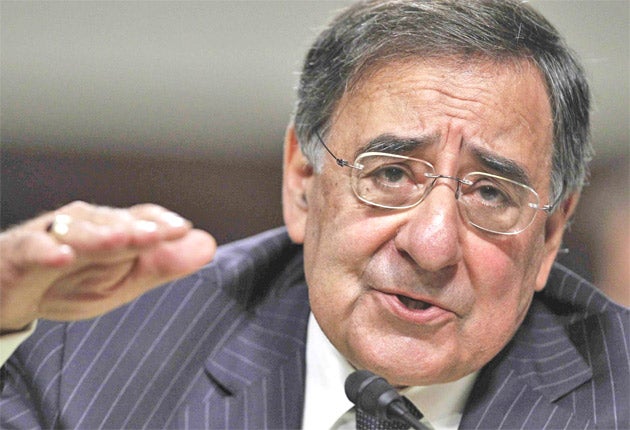Obama signals Afghanistan troop pull-out as new defence chief is ratified

President Obama signalled in an Oval Office address last night that America's commitment to the war in Afghanistan is on the wane and 33,000 of just under 100,000 US soldiers are to be withdrawn within 15 months.
Click HERE to view graphic (215k jpg)
Timed to be completed at the end of September 2012 – just weeks before Mr Obama's seeks re-election – the draw-down is more rapid and more substantial than his military commanders would have liked, and will be seen as an acknowledgement of growing domestic impatience with the war after a decade of fighting.
Mr Obama said: "We are starting this drawdown from a position of strength. Al-Qa'ida is under more pressure than at any time since 9/11. Together with the Pakistanis, we have taken out more than half of al-Qa'ida's leadership. And thanks to our intelligence professionals and special forces, we killed Osama bin Laden, the only leader that al-Qa'ida had ever known.
"This is the beginning – but not the end – of our effort to wind down this war. We will have to do the hard work of keeping the gains that we have made, while we draw down our forces and transition responsibility for security to the Afghan government.
Some 10,000 soldiers will leave Afghanistan by the end of this year, with 23,000 more to come home before the 2012 election.Thus the surge of 30,000 additional soldiers that was ordered by Mr Obama at the end of 2009 to break the back of the insurgency essentially goes into reverse.
He added: "My fellow Americans, this has been a difficult decade for our country. We have learnt anew the profound cost of war – a cost that has been paid by the nearly 4,500 Americans who have given their lives in Iraq, and the over 1,500 who have done so in Afghanistan – men and women who will not live to enjoy the freedom that they defended.
"Over the last decade, we have spent a trillion dollars on war, at a time of rising debt and hard economic times. Now, we must invest in America's greatest resource: our people.
"The tide of war is receding. Fewer of our sons and daughters are serving in harm's way. We have ended our combat mission in Iraq, with 100,000 American troops already out of that country. And even as there will be dark days ahead in Afghanistan, the light of a secure peace can be seen in the distance. These long wars will come to a responsible end."
More withdrawal announcements can be expected. In May next year, the Nato allies which have troops in Afghanistan will attend a summit in Chicago to consider their withdrawal options.
The changed priorities come just as Mr Obama is also finalising a reshuffle of top foreign-affairs advisors. Leon Panetta, the outgoing CIA director, yesterday celebrated winning unanimous Senate confirmation as the new Pentagon chief, replacing the current US Defence Secretary, Robert Gates. As he moves into Mr Gates's office on 1 July, Mr Panetta's two priorities will be overseeing the reduction in troop commitments in Afghanistan and identifying significant defence cuts that Mr Obama is demanding in the order of $200bn (£125bn), or even $400bn, a year.
Mr Panetta has been mostly private in his views regarding Afghanistan and how fast the troop wind-down should be. However, his track record in Washington on budget control is well known. Under President Bill Clinton he served both as White House Chief of Staff and the Director of the Office of Management and Budget.
Meanwhile, General David Petraeus, who is known to have counselled the President to adopt a less hasty troop-withdrawal plan, will leave his job as top Nato commander in Afghanistan as early as next month to replace Mr Panetta at the CIA. Also leaving his job is the US ambassador to Afghanistan, Karl Eikenberry.
The pressures to reduce US commitments overseas are likely only to grow stronger as next year's presidential election nears and Congress grapples with the budget deficit. A first debate among Republicans vying for their party's nomination was notable in part because of its isolationist tone. Having Mr Panetta at the Pentagon is probably a more comfortable fit for Mr Obama as Mr Gates was held over from the George W Bush administration. Mr Panetta also has close ties with Hillary Clinton, the US Secretary of State. Squabbling between the State Department and the Pentagon has historically been a recurring problem for the White House.
While the budget battle between the White House and Republicans is fiercely partisan, there has been less disagreement on his foreign policy – with the exception of Libya, which is becoming a fast-growing source of resentment on Capitol Hill among members of both parties.
Mr Obama this week received unlikely praise from Mitch McConnell, the leader of the Republican minority in the Senate. "The administration has shown admirable flexibility in making decisions concerning national security and has shown that it is willing, on occasion, to put safety over ideology," he wrote in The Washington Post.
"President Obama launched a counter-insurgency strategy in Afghanistan, ignored calls to hastily withdraw from Iraq, and recently agreed to extend the Patriot Act without weakening its provisions or making them harder to use," Senator McConnell added.
Subscribe to Independent Premium to bookmark this article
Want to bookmark your favourite articles and stories to read or reference later? Start your Independent Premium subscription today.

Join our commenting forum
Join thought-provoking conversations, follow other Independent readers and see their replies